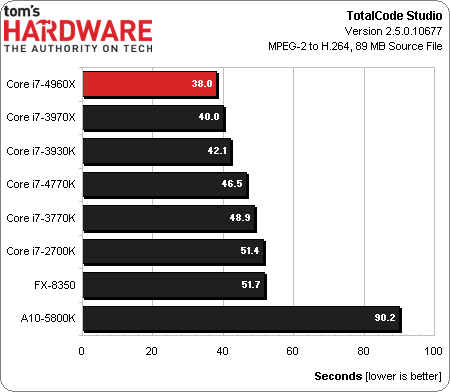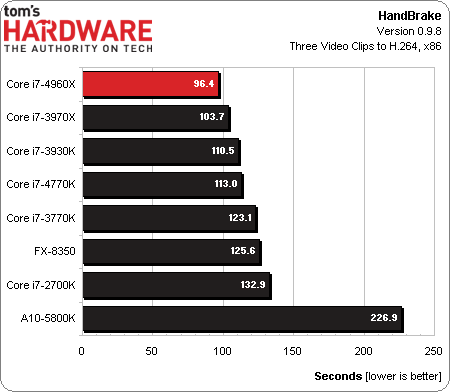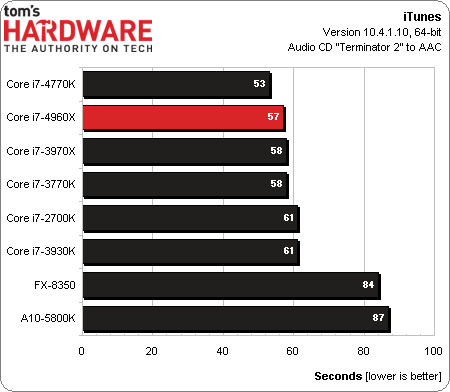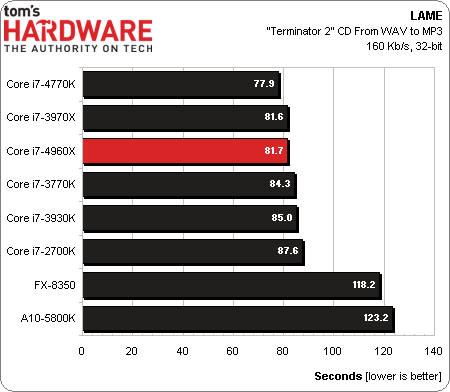Intel Core i7-4960X Review: Ivy Bridge-E, Benchmarked
Results: Media Encoding
Most of the video transcoding apps we use to test with are well-threaded, and TotalCode Studio (formerly MainConcept) is no exception. The Core i7-4960X takes the lead, followed by both Sandy Bridge-E-based chips. The quad-core competition trails behind as Core i7-4770K occupies fourth place.
The same applies to HandBrake, though Haswell isn’t quite as far behind Core i7-3930K in this benchmark.
iTunes (above) and LAME (below) are different in that they’re both single-threaded, which is why Haswell takes first place. Core i7-3970X and -4960X trade blows. We’d actually expect Ivy Bridge-E’s IPC advantage to carry it ahead more definitively, but that just doesn’t happen.
Regardless, these last two benchmarks gently make the point that the upcoming Ivy Bridge-E-based processors excel in well-threaded workloads and trail slightly to Haswell in lighter tasks.
Get Tom's Hardware's best news and in-depth reviews, straight to your inbox.
Current page: Results: Media Encoding
Prev Page Results: Compression Apps Next Page Power Consumption, Ivy Bridge-E’s Big Surprise-
Someone Somewhere Probably would have been nice to be 8-core. Isn't the actual die on these things just a cut-down 12-core chip? Think I read that somewhere.Reply
EDIT: Minor error:
surface alongside Haswell-based 9-series chipsets
Shouldn't that be Broadwell? -
designasaurus There's a rumor going around that Ivy-E is going to have a soldered heatspreader instead of using thermal paste. Obviously this would be a big differentiator for enthusiasts picking between Haswell and Ivy-E. Given your access to Ivy-E, do you guys at Tom's have any opinions on this rumor?Reply -
killerchickens I bet it overclocks like a beast. :)Reply
Lol now time to spend $1000 to save on my power bill. -
ingtar33 about all i'd expect. shame really, but it looks like the enthusiast market is at a standstill till AMD starts to compete again.Reply -
sna too early to judge...Reply
The 6 cores ivyBridge-e "K" version is the real thing.
and I dont get it , how Tomshardwae fails to say about the SandyBridge-e not having PCIE 3.0 support , while the ivy-E has PCIe 3.0 support . this is a Big factor here. -
ingtar33 Reply11172422 said:too early to judge...
The 6 cores ivyBridge-e "K" version is the real thing.
and I dont get it , how Tomshardwae fails to say about the SandyBridge-e not having PCIE 3.0 support , while the ivy-E has PCIe 3.0 support . this is a Big factor here.
they did say it. You didn't read the beginning of the review. Of course pci-e 3.0 is a gimmick and not a reason to buy a new 2011 mb and ib-e chip... and it will remain a marketing gimmick untill gpus can actually be bottlenecked by pci-e 2.0 x16... high end gpus barely bottleneck on pci-e 2.0 x8 atm... it will be a little while (another generation or 3) before gpus will NEED pci-e 3.0.
-
Someone Somewhere Replyofficial PCI Express 3.0 compliance (remember, Sandy Bridge-E only claimed 8 GT/s signaling support), and 22 nm manufacturing.
That's pretty much saying it did it unofficially.
Besides, you have to look hard to find something bottlenecked by PCIe2.0x8; even high-end GPUs won't run into bandwidth limitations. -
CommentariesAnd More WOW !!!!!!! So Intel is expecting someone to spend another 1000 bucks just for a 10-20% boost. Yay!!!!!!!! This is Ivy Bridge-E. I am getting it , YAY!!!!!!!!!!!!!Reply -
shin0bi272 still no gaming benchmarks eh? I guess I'll save my money and stick with my i7-920 for a little bit longer.Reply




